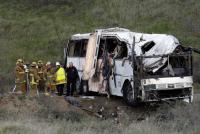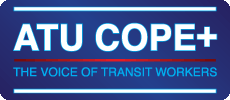Los Angeles Times Investigates Discount Bus Operators
TIJUANA — From a gated yard on a gritty street in this border city, white-paneled tour buses would set out for Disneyland, Knott's Berry Farm and other California destinations.
When the time came for Scapadas Magicas to undergo its annual U.S. inspection in January, the bus company reported that its terminal was in San Diego — at an address that did not exist. Soon afterward, Scapadas Magicas did present two buses for inspection by the California Highway Patrol, which found them to be in working order and cleared them for operation.
Two and a half weeks later, one of the company's buses — one it did not bring to the inspection — rolled over on Highway 38 in San Bernardino County, killing seven people returning from a trip to Big Bear and the driver of another vehicle.
While the cause of the crash remains under investigation, the accident has opened a window onto lines like Scapadas, exposing what critics say are business practices that allow cross-border firms to skirt U.S. laws.
Motor coach safety is overseen by the U.S. Department of Transportation and enforced in California by the CHP. Scapadas and other Mexico-based companies, which provide essential transportation services and boost tourism, are subject to the same regulations as U.S.-based carriers.
All operators face two kinds of inspections: random roadside stops and annual reviews that focus on vehicle maintenance and driver records.
The scheduled inspections typically occur at bus yards, where authorities can access the vehicles, driver records and maintenance histories.
But some Mexico-based operators are handled differently.
Scapadas had a small office in National City, but its bus yard was on Avenida Quintana Roo, near downtown Tijuana. The company listed its U.S. terminal at an address in a light industrial district in San Diego that is not listed on county assessors' records.
For the January inspection, Scapadas' buses were taken to a CHP station in San Diego's Otay Mesa district. As required, company officials presented bus and driver records, and inspectors looked over two vehicles, CHP officials said.
But because annual reviews rely on an honor system, inspectors didn't know Scapadas had an additional bus. As far as officials knew, said CHP spokeswoman Fran Clader, Scapadas "complied with everything they were required to comply with. That's why they got a satisfactory rating."
Officials said it's not uncommon for Mexico-based bus lines — and some U.S. operators — to set up inspections at a pre-arranged location. Many are smaller operations with storefront offices and off-site bus yards.
Sgt. Dave Dreher of the CHP's border division commercial enforcement unit said the result is that officials don't always get a full picture of Mexico-based operators.
"It sure would be nice if we could drive to Tijuana to check out their terminals, but we can't," Dreher said. "It would add a measure of safety to our inspection process as a whole."
Federal transportation authorities shut down Scapadas Magicas within one week of the Feb. 3 accident.
The company's buses had been cited 59 times for maintenance violations in the past two years, a record considered so serious that it already was on a federal watch list that flagged its buses for increased roadside inspections.
The bus that crashed was last inspected by the CHP in May 2012. It was given a "brakes out of service" violation for having 20% or more of its brakes defective.
After the accident, federal authorities determined that the information Scapadas had disclosed in the annual review was riddled with discrepancies and that the company had painted an inaccurate picture of its operations.
"Investigators have found that the company had failed to ensure that its vehicles were systematically inspected, repaired and maintained, and that its drivers were properly qualified and licensed, contrary to information provided by company officials in January 2013," a Transportation Department statement said.
Scapadas' Tijuana bus yard is located on a lot sandwiched between automobile repair businesses. The day after the accident, a white-paneled bus shared the parking lot with a few cars and a taco cart. The next day the bus yard was empty, the gate locked.
Maria McDade, who said she was Scapadas' administrator for more than 20 years before retiring last year, said records were kept at the National City office and the buses were stored in Tijuana. She suggested mechanical issues were a constant problem. "These buses, you never know if they're OK," she said in a recent interview.
The company's owner, Ramon Ramirez, did not return phone calls seeking comment. Several people who were injured in the crash have filed a lawsuit against Scapadas.
Cross-border companies have legitimate reasons for keeping buses in Mexico. Their passengers typically are locals who need to be picked up, often early in the morning, near the border.
But that shouldn't spare them from complying with safety regulations, some consumer watchdog groups said.
"It concerns me that a company can locate its terminal five seconds away from the border and shield its buses from adequate inspections by state and federal regulators," said Julianne Fellmeth, administrative director of the University of San Diego's Center for Public Interest Law.
According to federal data, 78 cross-border passenger bus lines operate in the U.S. Under agreements with the Mexican government, federal officials can conduct inspections across the border, but CHP officers cannot.
U.S. bus companies cast a wary eye on their Mexico-based competitors, complaining that they operate in a gray area.
Debbie McLeod, sales director at Sun Diego Charter bus service, said many Mexico-based bus lines are well managed and safety-conscious. But she expressed frustration that her company undergoes more stringent enforcement than some "subpar operators that are flying under the radar."
The CHP's Dreher, however, said Mexico-based buses in some ways are subject to greater scrutiny because they are more likely to receive random stops after they cross the border. Tijuana is off-limits to CHP inspectors, he said, "but we do the best we can by conducting roadside inspections."








